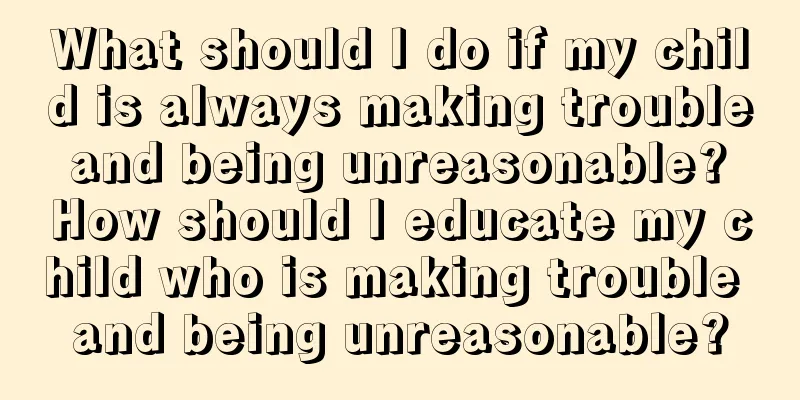What should I do if my child is always making trouble and being unreasonable? How should I educate my child who is making trouble and being unreasonable?

|
Many parents are at a loss as to what to do with their children's crying. Today, let's talk about the most correct way to deal with children who are making trouble for no reason. Effectively dealing with a baby's crying can not only help the baby learn the truth, but also regulate his future behavior. What to do if your child is being unreasonableIn the face of children's "crying threats", it is recommended that parents try the following practices: Three steps to effective communication When children keep crying, some parents will scold them with a sharp voice. As a result, parents themselves become bad role models. The louder you are, the more your children will cry. When communicating with your children, parents can follow the following steps: Step 1: Body Language Use body language to cue the child, hold the child by the hand and use body language to calm the child. You don't have to hug him, but you can hold his hand or support his shoulders. Step 2: Eye contact Squat down and look your child in the eye, let him feel that his mother is paying attention to him, and stabilize his emotions through physical contact. Step 3: Voice Communication Talking to children in a low but serious voice instead of a sharp voice can make them feel that this is an unusual decision from their parents, and it can also encourage them to concentrate, divert their attention, and forget their crying. Using a lower voice also makes children understand that this is a "private voice" between parents and children, which brings them closer to their children. Distracting attention When a child is crying, parents can put the things he is interested in not far away from him and leave the scene. After the child cries for a while and no one pays attention to him, he will see the things he is interested in and immediately be attracted to them. He will play with them very devotedly. This can successfully divert the child's attention and make him forget the unreasonable request. Take cold treatment When a child cries, if the parents stand by, the child will get more and more angry. At this time, it is better to use the cold treatment. Parents should not force the child to stop crying immediately, but sit quietly by the side, or simply do something else and let him cry and make a fuss. After crying enough, he will calm down and feel that his behavior is not welcomed by the parents and does not get the parents' attention and love, so he will automatically reduce this behavior in the future. If it is at home or indoors, parents can sit next to him and watch him calmly, which will also have a deterrent effect on him; if it is in a public place, you can lead the child to a quieter corner. Always stick to one standard When some children cry, family members will have disagreements, which gives the children an opportunity to take advantage of the situation and encourages them to cry. Between husband and wife: stick to one standard Always stick to one standard, for example, a rule that children are not allowed to eat snacks before meals. If the father or mother indulges the child and agrees to the child's request, the child will find a way out and cry to achieve his or her goal. Both husband and wife should always stick to one standard and not change it no matter how much the child cries. Between grandparents and parents: harmony Many grandparents spoil their children without principles. When children cry, they advocate satisfying them, but parents oppose. Parents should communicate well with grandparents, and family members should unanimously say "no" to children's excessive demands, showing a firm and uncompromising attitude. Then children will know that they will not be supported if they continue to cry, and gradually stop crying. Why do children lose their temper?Children often lose their temper when they are tired or hungry. If your child often loses his temper, you should carefully review his daily routine. Reasons why children lose their temper Fatigue: Children aged 2-3 years old may no longer need to take naps, but they still do not have enough physical strength to sustain a nap for too long. If they can go to bed early or let them be quiet for a while in the afternoon, they can also avoid crying due to tiredness. Frustration: Frustration is also one of the main reasons why children lose their temper and cry. Two-year-old children grow up very fast, but they don’t have enough ability to do some things they want to do. At this time, parents should lend a hand in time to prevent their children from being too frustrated. Of course, frustration is a necessary process of learning, and children "must" accept challenges and learn to deal with frustration. How to deal with children's unreasonable behavior1. Stop the child's bad behavior in time. For example, if the child smashes things or hits people, first control the child's hands and tell him that this is wrong and that it will hurt others. What are the consequences of hurting others? But do not label the child, such as being unreasonable, ignorant, impolite, disobedient, etc. 2. Tell your child that crying will not solve the problem, and that he must vent his emotions in a reasonable way. For example, when your child is angry, tell him that he can hit a pillow, tear up newspapers, or find a place where no one is around and yell a few times. At the same time, confirm with him that this method is very effective, and tell him that his father also vents his anger in this way. 3. Teach children to learn to use language when their needs are not met, that is, to express themselves through speaking. For example, if mom doesn’t buy you that bubble blowing toy, and you are really angry, it is much more gentlemanly to say it out loud than to cry. And you should also tell your child that crying and losing your temper will not produce any effect, but will make mom insist on not buying it. Speaking nicely, negotiating reasonably, and expressing your own ideas and reasons can get more responses and help. 4. In order not to disturb the child's sense of security, the mother should tell the child that she understands him. For example, the mother understands the child's mood when he wants popcorn but cannot get it, and the child should know that the mother has always loved him. At this time, the mother should not rush to explain her reasons, because the child's emotions have not calmed down, and the more she explains, the more unhappy the child will feel. 5. After the child's emotions have calmed down, the mother can then slowly explain to the child why his request cannot be met. So please parents believe in your children. Every child has their own self-control and can manage themselves. It's just that some children need more time. However, parents cannot care about nothing. What you need to do is to stimulate your children's self-control with your deepest love, warmest acceptance, and gentlest persistence. Slowly, children will understand their parents' bottom line and learn how to control this unreasonable way of venting. |
<<: Why is my breast milk yellow? Can I still breastfeed if my breast milk is yellow?
>>: Can I drink Isatis root during breastfeeding? Can I drink Isatis root during breastfeeding?
Recommend
How to train your baby to eat by himself? How to train your baby to eat by himself
When babies are young, they need to be fed by the...
What are the effects of a baby grinding his teeth while sleeping? 5 effects to pay attention to
Many babies will show symptoms of teeth grinding ...
What are the conditions for IVF? Who is suitable for IVF?
IVF is a medical method for infertile couples. It...
Can babies wear open-crotch pants in summer? Are there any harms for babies wearing open-crotch pants?
Summer is here, and many people like to change th...
Which one is better, Kao toothpaste or Lion toothpaste? How to tell if Kao toothpaste is authentic?
Kao toothpaste and Lion toothpaste are both well-...
Will taking Tianxi Pills affect ovulation? Does Tianxi Pills promote ovulation?
Many women take Tianxi Pills to regulate menstrua...
How many times a day is normal for a breastfed baby to defecate? Introduction to the defecation of breastfed babies
How many times a day is normal for breastfed babi...
Can babies eat persimmons? Can babies eat persimmons?
There was news that babies may be poisoned if the...
Where is the baby's fontanelle? Where is the fontanelle?
The fontanelle is an organ on the baby's head...
Can pregnant women eat oil oranges? How to eat oil oranges
The oil orange is a green fruit. Although it can ...
Will breastfeeding make your breasts bigger? Changes in breasts after breastfeeding
Will breastfeeding make breasts bigger? Many moth...
How to choose a baby food processor? The difference between a baby food processor and a juicer
The food processor is a machine that helps mother...
Will children get lead poisoning when they chew pencils? Will children's chewing pencils affect their health?
Today we find that more and more children are suf...
Will the ovulation injection have any effect on the fetus?
After trying to conceive for several months, pros...
Why do foreigners like to adopt Chinese children? There are many abandoned babies in China
In China, many children are abandoned by their pa...









